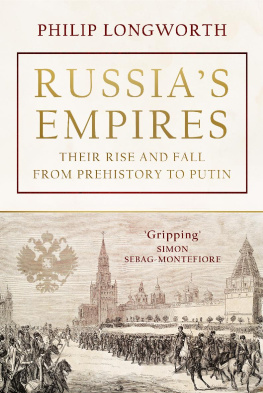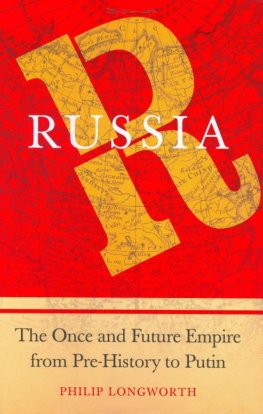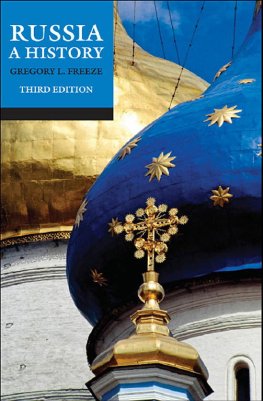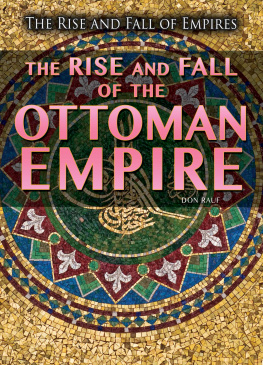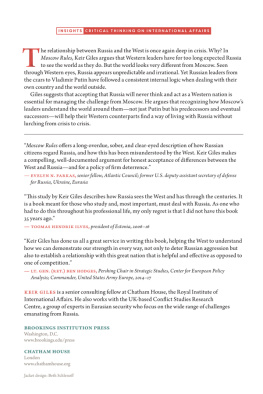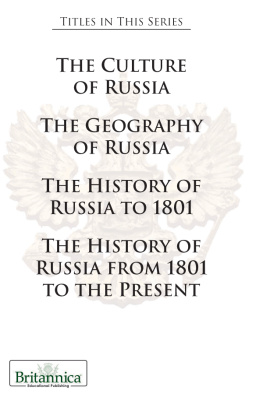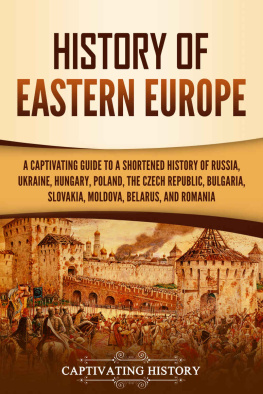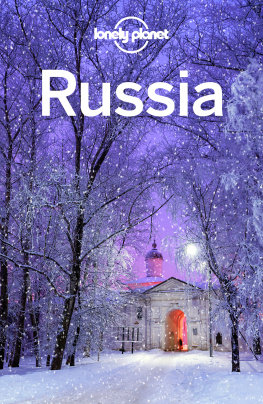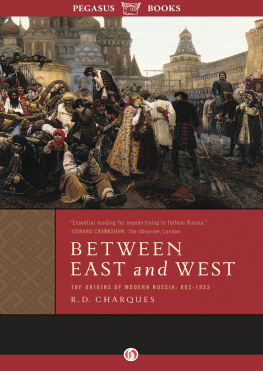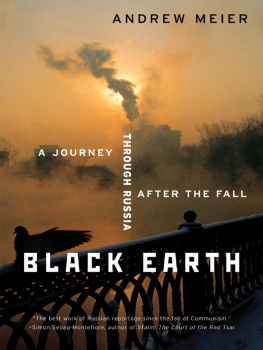RUSSIAS EMPIRES
Their Rise and Fall: From Prehistory to Putin
Philip Longworth
First published in 2005 by John Murray (Publishers)
Copyright Philip Longworth 2005
This edition published in 2020 by Lume Books
30 Great Guildford Street,
Borough, SE1 0HS
The right of Philip Longworth to be identified as the author of this work has been asserted by them in accordance with the Copyright, Design and Patents Act, 1988.
All rights reserved. No part of this publication may be reproduced, stored in a retrieval system, or transmitted in photocopying, recording or otherwise, without the prior permission of the copyright owner.
Table of Contents
Preface to the Paperback Edition
A fifth Russian empire is now under construction. Until a few months ago that prospect seemed most improbable if not impossible. The Soviet Empire had collapsed; parts of it absorbed into the European Union, and the USSR itself was being carefully dismantled. Ukraines Orange Revolution and the Rose and Tulip Revolutions of Georgia and Kyrgyziia seemed to be taking these countries out of the Russian orbit for good. Zbigniew Brzezinski has remarked that without Ukraine Russia could not be an empire and most experts echoed Robert Cottrells conclusion that Moscow could no longer seriously hope to regain any of the ground it has lost in the past fifteen years.* A sober assessment of realities in the light of the past might have been a surer guide.
In January 2006 there was another dramatic turn of events when Russia cut supplies of gas to Ukraine on the grounds of non-payment of new, less subsidized prices, indirectly threatening supplies to Western Europe. The energy-hungry world took note: Russia had power and influence again.
At the same time opinion in what Russians call the near abroad shifted. Iulia Timoshenka herself now believes that her Orange alignment will lose the March elections; and in other areas, too, pro-Western advances are being rolled back. An attempted revolution in Uzbekistan failed; another in Azerbaidjan was aborted and America is quitting bases in Central Asia. Meanwhile the EUs refusal to admit Turkey to membership in the near future leaves Georgia, like Ukraine, out in the cold. In this context Russia begins to take on the guise of a potential protector rather than an oppressor.
But Russias ascent is not only due to her vast energy reserves and control over pipelines. Her economy generally has been growing apace in recent years and its expansion is expected to continue. With it grows Russias attraction as a market in the space of the old Soviet Union and beyond it. The new Russian Empire will not be like the last, but a sphere of influence, as is the American. It may not need force of arms in order to grow. Circumstances are promoting a natural expansion.
I have taken the opportunity to correct three errors and a typographical mistake.
London, February 2006
Introduction
Most empires rise, expand and then collapse and once collapsed do not revive. But Russias case is different. Russians have built no fewer than four empires. The first, the medieval commercial colonial empire of Kievan Rus, was destroyed in the 1200s. But some time later a new absolutist imperium, which tried to replicate something of the glory of the later Roman Empire, arose. It was centred on Moscow, the Third Rome of legend. In the later sixteenth century, under Ivan the Terrible, it began to expand vigorously towards the Baltic, the Caspian and, across the Urals into Asia. Then, in the early 1600s, the state which was the motor of this empire suddenly seized up; Russia dissolved into confusion, and the neighbouring Poles were able to install their own tsar in the Kremlin. Yet out of the debris of Russias imperial collapse a third, more conventional, European dynastic empire soon emerged, rooting itself in the remains of its predecessor.
This Romanov Empire came to serve as the epitome of Russias power and aggression. It expanded into Ukraine, extended its hold on Siberia as far as the Pacific and the gates of China, and, having humbled Poland-Lithuania, proceeded to demolish the two great powers which dared to challenge it: Sweden and Napoleonic France. Having established itself as the strongest land power in Europe, it continued its expansion through the Balkans towards the Mediterranean, across the Caucasus, and, to the consternation of the British, into the heights of Central Asia. It became a sea power to reckon with in the north Pacific, and even came to exert a certain influence in China. The Romanov Empire suffered reverses in the Crimean War and against Japan in 1904, though it lost little territory and influence as a result. Soon afterwards, however, during the First World War, this empire, too, disintegrated.
The Soviet state which supplanted it seemed unlikely to survive. Russia was racked by civil war, and was promptly invaded by British, French, Japanese and American troops. It lost a war with Poland too. Bankrupt, friendless and besieged, it nevertheless contrived, within the remarkably short span of a quarter of a century, to recover sufficiently to inflict a comprehensive defeat on Hitlers Germany, Europes strongest military and economic power, together with its allies, and to dictate the shape of post-Second World War Europe. This Soviet Empire more centralized and ideological than any of its predecessors became the most extensive and powerful of all. It was also the most short-lived.
The purpose of the book is to examine the phoenix-like nature of Russian imperialism and improve our understanding of it. Why the strange alternation between aggression and fragility? Why the tendency for Russian empires to disintegrate as they did around the years 1240, 1600 and 1918, but then to rise from the ashes stronger than before? Why, for that matter, do Russians, as a society, tend to alternate between torpor and manic energy, and what are the sources of their resilience? What has enabled them to withstand invasions by numerically and technologically superior armies; to spring back and gain the strength to conquer immense tracts of territory and exercise dominion over millions of subjects of diverse cultures?
To find adequate explanations for these phenomena we need to describe the rise and fall of each Russian empire and inquire into its strengths and weaknesses. But we also have to delve back to times before the modern era which most general histories treat either cursorily or not at all,1 for it is only there that we can hope to find evidence that might illuminate some basic questions concerning the character of Russians: their psyche, habits and the singularities of their institutions, all of which were formed over time and in relation to physical conditions. And here we encounter a problem, because the early chronicles were composed to sustain the legitimacy and claims of princes rather than to provide objective records of circumstances and events. Nor are the earliest travellers accounts always reliable. Furthermore, such accounts begin too late in time. Since, as we shall see, there are good, scientific, reasons to believe that the Russians ancestors were explorers and colonizers for some time before the fabled founding father Riurik and his band of Viking venturers ever established themselves in their land, a way must be found of establishing relevant developments in periods unrecorded by conventional history.
To trace the origins of Russian imperialism, then, we need a wider range of tools than is offered by conventional history. The first chapter of this book will therefore exploit the findings of non-historical science genetics, anthropology, archaeology and linguistics to explore the roots of the phenomenon: the making of the landscape which formed the Russians habitat, their diet, physiognomy, migratory patterns, habits, capacities and disposition. Readers should discover that some of these findings will resonate from time to time throughout the book. However, those who prefer conventional history should start with Chapter 2 (where for their benefit I have repeated a few essential points made in Chapter 1).
Next page
